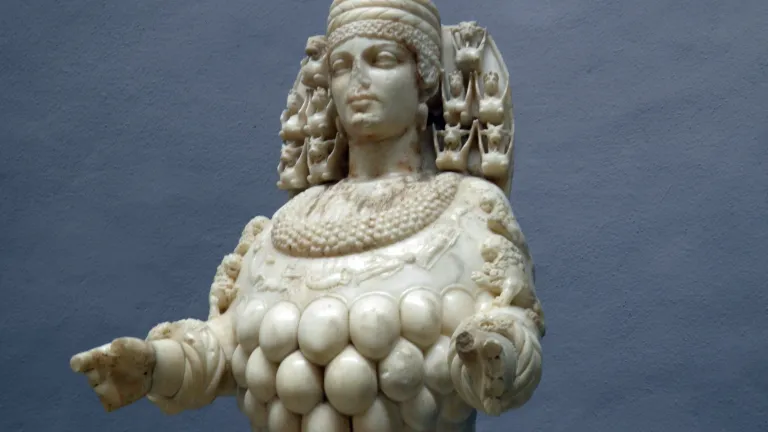Paganism Is Popular Because It Is Profitable - Prime Example: Halloween
The pagan holidays are “popular” because they make a lot of money for a lot of people.
Americans are frightened by the ongoing recession, but, ironically, a large percent are not afraid to spend pretty scary amounts for Halloween!
Incredibly, seven in 10 Americans plan on celebrating the holiday this year—almost 5 percent more than last year—according to the National Retail Federation’s 2011 Halloween Consumer Intentions and Actions Survey.
The expected expenditures total $6.86 billion! That includes $1 billion on children’s costumes, $1.21 billion on adult costumes, and $310 million on pet costumes.
The average consumer is expected to spend $72.31 on decorations, costumes and candy.
According to the NRF, the amount spent each year on Halloween decorations is second only to spending on Christmas décor.
That’s the “bottom line”! The pagan holidays are “popular” because they make a lot of money for a lot of people.
But as consumers, we need to do some re-thinking. What a person chooses to spend his money on says a lot about his priorities, principles and beliefs.
And what source can we rely on to help us formulate the best priorities, principles and beliefs? The Bible, God’s Guidebook for humanity.
Please don’t be satisfied with what you’ve learned at church about the Bible. I grew up going to church almost every Sunday and eventually realized I had learned very little about the Bible, and much of what I thought I had learned was false! When I began to read the Bible for myself, I was amazed at what I was learning!
Some history that helps explain Halloween-type practices
How did America transform from almost no one observing pagan holidays in the 18th century to almost everyone observing them in the 20th century?
The industrial revolutions of the 18th and 19th centuries and the technological revolution of the 20th century greatly raised the average living standard and brought about many other benefits. But they also paved the way for the many materialistic and expensive traditions.
To observe pagan holidays, think of how much is spent for decorations, parties, costumes, gifts (often obligatory “gifts”), greeting cards, wrapping paper, music, “adult beverages,” etc., etc. The modern mass-production of all these things makes them highly profitable for the manufacturers and retailers.
But what motivates people to buy? It is largely the power of advertising. These holidays have been highly commercialized because they are big money-makers. We are bombarded with advertising from seemingly everywhere. It’s difficult not to be brainwashed by all of that ubiquitous influence.
Then the peer pressure is huge. It seems like everyone is celebrating these days. And since it seems that everyone is spending lots of money on attractive stuff, we are made to feel like cheapskates if we don’t do the same. It seems downright un-American to consider doing anything else. Ask yourself: Would you ever dream of wasting your time and money on Halloween-type stuff if you weren’t surrounded by a culture doing these silly things?
It’s especially amazing to see how adult parties and costumes have soared in popularity during the last several years.
Pagan religions have always emphasized idols and images, whereas God forbids those things. God emphasizes truth through the spoken and written word. Therefore pagan religions have always been opportunities for profitable merchandising.
A fascinating illustration is in Acts 19:23-41. The preaching by the apostle Paul in Ephesus led to many turning away from the worship of Diana to the worship of God. This hurt the business of the silversmiths who made silver shrines of Diana. Demetrius stirred up the other silversmiths and a riot erupted that almost got Paul killed.
The 18th chapter of Revelation describes the downfall of the evil end-time system called Babylon. It will be an economic, political, religious and military system. Let’s notice why the merchants of the that system will be mourning its downfall.
“And the merchants of the earth will weep and mourn over her, for no one buys their merchandise anymore” (Revelation 18:11). “The merchants of these things, who became rich by her, will stand at a distance for fear of her torment, weeping and wailing” (verse 15). Thus we see what their main motivation will be. Their real god will be money.
Some conclusions
Observing the biblical festivals generally involves fun social and recreational activities, travel and gift-giving, but a major reason for their lack of popularity is that their observance doesn’t generate much financial profit for anyone. Therefore, there is virtually no advertising, etc.
Let’s remember this admonition from Paul: “For the love of money is a root of all kinds of evil, for which some have strayed from the faith in their greediness, and pierced themselves through with many sorrows. But you, O man of God, flee these things and pursue righteousness, godliness, faith, love, patience, gentleness” (1 Timothy 6:10-11).
The Bible warns that greed and covetousness are sinful. On the other hand, the Bible exhorts us to be seeking the spiritual riches.
The pagan holidays are popular largely because they are financially profitable.
God’s Holy Days are spiritually profitable.
I encourage you to read the booklet, Holidays or Holy Days: Does It Matter Which Days We Observe?




